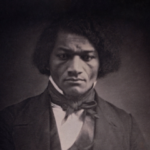Frederick Douglass, a Former Slave, Extolled the Virtues of American Citizenship
February 18, 2022
By Timothy Sandefur
The abolitionist, philosopher, and former slave Frederick Douglass used to say that citizenship depended on three boxes: the ballot box, the jury box, and the cartridge box. Americans of all races, he believed, have the right to serve on juries, to defend themselves with arms, and to vote in elections. A new video from the Federalist Society, which I am interviewed in, examines Douglass’ work to secure voting rights in the years following the Civil War.
There’s an interesting way in which Douglass viewed voting rights differently from the way people today tend to think of them. Nowadays, it’s common to speak of democracy as a fundamental good—as the central feature of our Constitution. But that’s not actually true. The American constitutional system uses democracy as a means, not an end in itself. Instead, voting is designed and limited in order to secure the greater good of protecting individual liberty. Many people today view voting as the crucial mechanism for creating a good society—but for people like Frederick Douglass, it was instead a mechanism for protecting oneself against wrongdoing by politicians and the tyranny of the majority.
That was a major concern for Douglass after the Civil War, because southern states were attempting to reinstitute slavery, or something like it—and since the former slaves were often outvoted, they were vulnerable to having their freedoms voted away by white people. For Douglass, voting was a form of self-defense more than a tool for creating some ideal kind of society.
But the right to vote was also part of what it meant to be a full citizen—and Douglass was emphatic about the citizenship of black Americans, even before the Civil War. One consistent theme throughout his nearly six-decade career was that black Americans are Americans, not an alien people—and that they should never allow themselves to be alienated, let alone alienate themselves, from their native land.
“By birth, we are American citizens,” he declared in 1853, four years before the Dred Scott case:
“By the principles of the Declaration of Independence, we are American citizens; within the meaning of the United States Constitution, we are American citizens; by the facts of history, and the admissions of American statesmen, we are American citizens; by the hardships and trials endured; by the courage and fidelity displayed by our ancestors in defending the liberties and in achieving the independence of our land, we are American citizens.”
But it was not only white Americans who claimed that America was only for white people. Many black activists embraced the idea of colonization, arguing that black Americans should abandon the country and move to Africa or Central America to establish colonies there. For his entire life, Douglass denounced this notion. “All this ‘native land’ talk is nonsense,” he insisted:
“The native land of the American negro is America. His bones, his muscles, his sinews, are all American. His ancestors for two hundred and seventy years have lived, and labored, and died on American soil, and millions of his posterity have inherited Caucasian blood…. The worst thing, perhaps, about this colonization nonsense is, that it tends to throw over the negro a mantle of despair. It leads him to doubt the possibility of his progress as an American citizen…. It tends to weaken his hold on one country while it can give him no rational hope of another. Its tendency is to make him despondent and doubtful, where he should be made to feel assured and confident. It forces upon him the idea that he is forever doomed to be a stranger and a sojourner in the land of his birth.“
How little he would have thought of those who today continue to argue that America is a land only for white people, and that black Americans should accept despondency and doubt, and regard themselves as strangers in the land of their birth.
Timothy Sandefur is the Vice President for Litigation at the Goldwater Institute.
Get Connected to Goldwater
Sign up for the latest news, event updates, and more.

Donate Now
Help all Americans live freer, happier lives. Join the Goldwater Institute as we defend and strengthen freedom in all 50 states.
Donate NowSince 1988, the Goldwater Institute has been in the liberty business — defending and promoting freedom, and achieving more than 400 victories in all 50 states. Donate today to help support our mission.

We Protect Your Rights
Our attorneys defend individual rights and protect those who cannot protect themselves.
Need Help? Submit a case.



